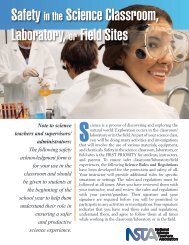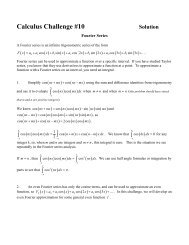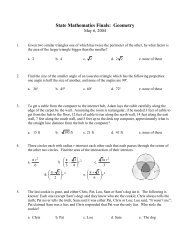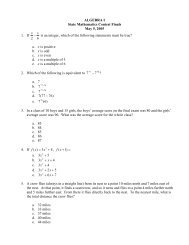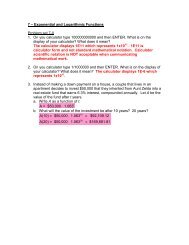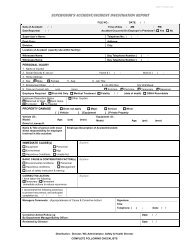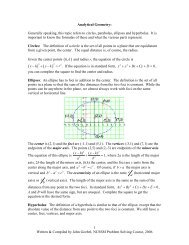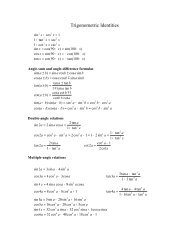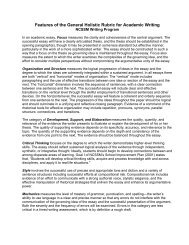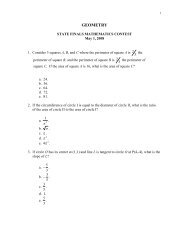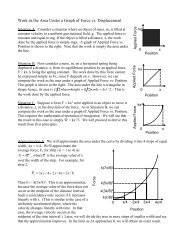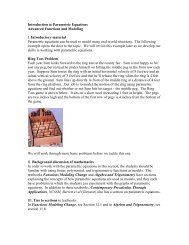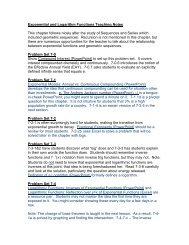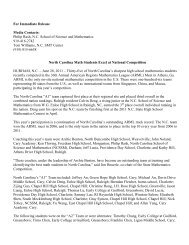NCSSM COURSE CAtAlOG - North Carolina School of Science and ...
NCSSM COURSE CAtAlOG - North Carolina School of Science and ...
NCSSM COURSE CAtAlOG - North Carolina School of Science and ...
Create successful ePaper yourself
Turn your PDF publications into a flip-book with our unique Google optimized e-Paper software.
Research in Computational <strong>Science</strong> provides students with the opportunity to<br />
learn the technologies, techniques, <strong>and</strong> tools <strong>of</strong> computational science as<br />
applied to interesting <strong>and</strong> complex problems in biology, chemistry, physics,<br />
medicine, environmental <strong>and</strong> earth sciences, or other disciplines. Entry is by<br />
application to the instructor <strong>and</strong> requires permission <strong>of</strong> the Dean <strong>of</strong> <strong>Science</strong>. The<br />
sequence begins as early as the winter trimester <strong>of</strong> the junior year <strong>and</strong> continues<br />
up to four trimesters through the planning, implementation, analysis, <strong>and</strong><br />
presentation <strong>of</strong> an original research project. Students interested in biology have<br />
the opportunity to participate in a videoconferencing computational biology<br />
(bioinformatics) program with the Jackson Genomics Lab in Maine.<br />
Courses:<br />
IE442 Research in Computational <strong>Science</strong> I<br />
IE444 Research in Computational <strong>Science</strong> II<br />
IE446 Research in Computational <strong>Science</strong> III<br />
IE448 Research in Computational <strong>Science</strong> IV<br />
Research in Mathematics<br />
Students earn a research credential in Mathematics by successfully completing<br />
an upper level course in Mathematical Modeling or a two-trimester sequence<br />
researching an unsolved mathematical problem, typically in the fields <strong>of</strong> graph<br />
theory <strong>and</strong> complex systems. These options are project oriented, with students<br />
designing experiments to mathematically analyze real world problems,<br />
gathering <strong>and</strong> testing data then presenting their results. Entry is by permission <strong>of</strong><br />
the Dean <strong>of</strong> Mathematics. Students with a strong background in mathematics<br />
may be approved to begin the research sequence in the junior year, while<br />
Mathematical Modeling is open only to seniors.<br />
Courses:<br />
MA470 Mathematical Modeling<br />
MA472 Research in Mathematics I<br />
MA474 Research in Mathematics II<br />
<strong>NCSSM</strong> Research Symposium<br />
Each spring <strong>NCSSM</strong> showcases its student research programs in a Research<br />
Symposium, at which students present the results <strong>of</strong> their research activities<br />
though oral <strong>and</strong>/or poster presentations to the <strong>NCSSM</strong> community <strong>and</strong> invited<br />
guests.<br />
Summer Research Opportunities<br />
Juniors are encouraged to participate in additional research opportunities<br />
available during the summer break, whether sponsored by <strong>NCSSM</strong> or by outside<br />
agencies or programs. Summer research activities are especially important for<br />
students interested in competing in national competitions such as the Siemens<br />
7



